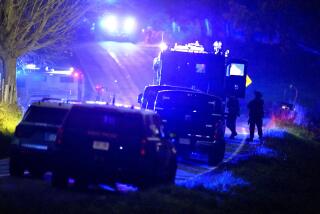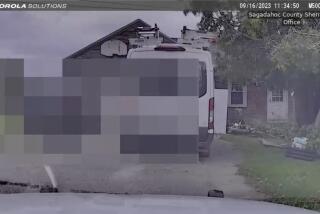N.H. Town Struggles to Live Free After 4 Die in Rampage
- Share via
COLEBROOK, N.H. — Under a cold rain and clouds as bleak as the mood in this small town of 2,500, residents on Thursday began trying to figure out how a community and its spirit survive the sudden loss of four leaders--two favorite policemen, a part-time judge and a newspaper editor.
It was as if their killer, a loner and longtime troublemaker named Carl Drega who went on a shooting rampage Tuesday afternoon, had blown a gaping hole through the town. And their job, many said as they struggled with their sadness and fury, was not to let him change their life or to make them afraid and suspicious of anybody eccentric or merely different.
For some, like newspaper owner John Harrigan, who spent the day trying to put out a weekly paper with what seemed like a lifetime’s worth of terrible news, it was important to see Drega as an isolated weirdo.
“This was our asteroid. This was a piece of Skylab coming down on us,” he said. “If we change, that’s letting Drega drive the engine, and he doesn’t deserve that kind of status in our community,” Harrigan said.
Around the small town, others met to make arrangements for a massive funeral for the two murdered troopers that was expected to draw as many as 4,000 people to the elementary school gymnasium. They talked about private funerals for the judge and the newspaper editor, and Town Manager Russell McAllister was arranging for a marble memorial to go in the square beside the memorials for Colebrook residents killed in the nation’s wars.
And through it all, they were hugging each other and shaking their heads in disbelief, wondering how it could have been prevented.
“I don’t know how you can do anything about this,” said McAllister as he walked in the rain from one town office to another making arrangements. “There’s no law against carrying a gun. There’s no law against being a little weird.”
Around the corner at the town’s electronic shop, Chamber of Commerce President Benoit Lamontagne and his wife, Karen, were still wrestling with Tuesday’s images of their friend, Vickie Bunnell, the lawyer and judge who was gunned down in a parking lot in front of their eyes.
Lamontagne shuddered as he mentally revisited the scene--the battered, stolen police car that Drega drove slowly down the street after he killed state troopers Leslie Lord and Scott Phillips. The moment when Bunnell, recognizing that Drega was finally carrying out his constant threats, ran out the back of her office where the expert marksman gunned her down instantly.
Then, suddenly Dennis Joos, the 51-year-old co-editor of Colebrook’s News and Sentinel, leaped at Drega and tried to stop him from shooting others. Drega shook Joos off with the ease of a madman and killed him with a spray of eight bullets before speeding away for a final shootout that left four injured and Drega dead.
“Isn’t this a national problem?” Lamontagne asked. “It’s getting so that more and more, any crackpot can go out and get guns and build bombs.”
At Drega’s home in Columbia about five miles south of Colebrook, troopers took reporters on tours Thursday to exhibit the arsenal he had collected, some of it apparently set to go off if authorities stormed his property. Arrayed on the ground beyond the smoldering ruins of his barn were pipe bombs, fuses, explosives, rifles and shotguns with night scopes.
Police and federal agents, who said they believed Drega had acted alone, were beginning to investigate where he bought the arsenal as well as instructional books about making bombs and booby traps.
That kind of firepower is new, Lamontagne said. Time was, he remembered, that when the odd ducks who traditionally inhabit the backwoods targeted some perceived enemy, they would march into town and punch the culprit in the face.
Standing beside Lamontagne was Bill Bromage, president of the First Colebrook Bank, who watched the rain pelt down on the black bunting added to the newspaper across the street. He and other town leaders had just canceled the weekend-long Moose Festival, the town’s biggest revenue-producing attraction. It was now inappropriate, he said, “with these four people missing.”
But as he stood for a few moments to talk, he seemed to mirror many in the town, the state and the nation who keep trying to figure out if there is a way to separate the natural stock of local eccentrics from killers like Drega.
Gun control is not much of an answer up here where there are still logging trucks rumbling down the highway and where during the hunting season nearly every pickup in town has a high-powered rifle resting in the gun rack.
In fact, government control of any kind is often considered ill-advised in this territory so far north that many of the names and radio stations are French Canadian. Freedom in New Hampshire is sanctified above community or sometimes even safety. Adults are not required to wear seat belts. The state motto is “Live Free or Die.”
A few days earlier, Drega had threatened Bunnell. Even though she had a restraining order against him, she told friends she was afraid. Before he began shooting, “he had all the rights and Vickie had no rights,” Bromage said. “We couldn’t do anything to keep him away from her.”
“You are also part of the problem,” suggested Bromage, pointing to a reporter. If the town had arrested Drega last week or a year ago when he was threatening people in authority like Bunnell, “you people in the media would be up here pounding on us for locking up some guy just because he looked weird or for taking away his rights because he was a strange dude.”
And if New Hampshire outfitted its state patrol with assault weapons so that they could compete with anybody toting a similar weapon, “you people would be in here making us look like a bunch of country bumpkins that just dropped off a turnip truck,” he said.
For many, the need at the moment is simply to cope. For some, the only way to begin filling the hole in their community was to start volunteering. Like the four who died, who worked on school projects and church committees and flipped hamburgers at the firemen’s picnics, those who remained began draping town signs and fixing food for the families of those killed and finding beds for the crowd arriving for today’s funerals.
“People here cope by giving, by volunteering, by participating,” said McAllister, the town manager. But replacing the lost talent in this small town will be hard. Bunnell was one of the town’s four lawyers as well as a part-time judge. She was a “mover and shaker,” as Harrigan put it. “Women especially liked going to her,” said Barbara Woodard, who runs a small inn with her husband.
The two troopers were well known in the area, not distant city cops but friends who smiled and helped people change tires. Joos loved to write, to coax out raw talent from people who came in the office planning to create nothing more than a letter to the editor and left with an assignment to cover the school board.
“You remove four people like that, you’ve taken away a lot of this town’s resources,” said Harrigan. “I don’t know how you fill in the slack.”
“The healing here,” agreed Karen Lamontagne, “it’s going to take a long, long time.”
More to Read
Sign up for Essential California
The most important California stories and recommendations in your inbox every morning.
You may occasionally receive promotional content from the Los Angeles Times.










